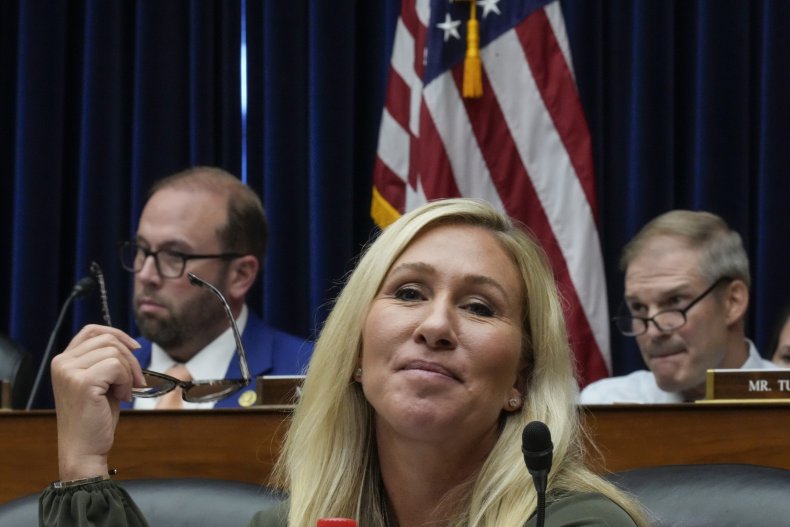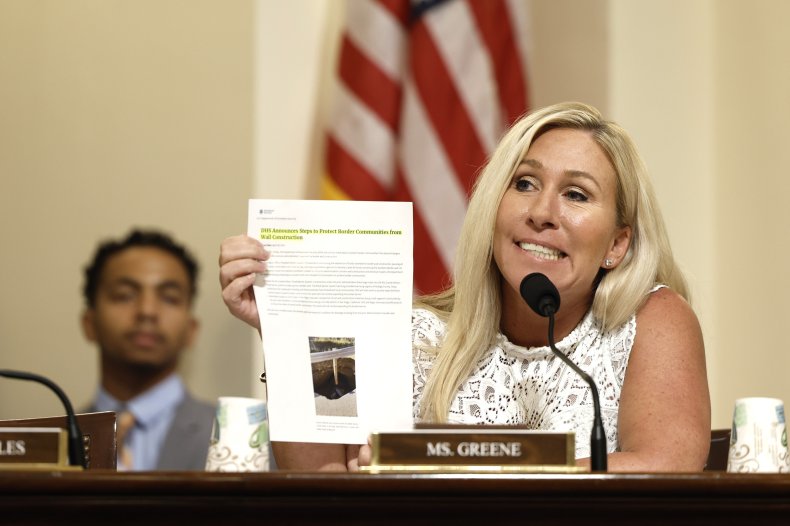In one of the most shocking congressional hearings in recent memory, Georgia Republican Representative Marjorie Taylor Greene showed partially censored nude photographs of Hunter Biden to witnesses and members of the House Oversight Committee as their investigations into the president's son continue.
The GOP-led committee's investigation has examined potential criminalities involving the Biden family, including purported business dealings involving shell companies and foreign investors.
About 2 1/2 hours into the hearing last Wednesday, Greene delved into Hunter Biden's sex life and different purported payments to escorts and sex workers.
Greene held up a large graphic reading, "Hunter recorded multiple sex tapes with a sex worker he had paid for out of his law firm's bank account," which was accompanied by multiple images of Hunter Biden engaged in sexual acts.

In the backlash that stemmed from Greene's decision, social media began to ask whether Greene had broken laws governing the publication of pornography, or more specifically, revenge porn laws.
One tweet by left-leaning podcaster Fred Wellman included text detailing charging conditions for "Second Degree Unlawful Publication of a Sexual Image," a misdemeanor punishable with jail time.
Wellman tweeted: "Here is a fun fact: Marjorie Taylor Green violated the District of Columbia Revenge Porn ordinance today when she shared Hunter Biden's nude pics in the House of Representatives. She must be investigated immediately."
This and similar messages were viewed millions of times online, the applicability of the law's wording seeming to fit the description of what happened at the hearing.
As the material Greene showed was said to have been taken from Hunter Biden's laptop—a source still subject to questions about how it came into Republican possession—the matter became even muddier.
Greene defended her decision to show the images during the hearing, saying in an interview with Newsmax that the photos were "the evidence that I believe the American people deserve to see because when the American people can see this evidence, as uncomfortable as it was for me to show it on the Oversight Committee today, I believe that's how they can hold this government accountable."
Nonetheless, many continued questioning whether Greene broke the law. With the advice of relevant experts, Newsweek investigated whether the claims about Greene were true and, if so, whether she could be punished.
What is revenge porn and when was it banned?
"Nonconsensual pornography" is defined as the distribution of "sexually graphic images of individuals without their consent," according to the Cyber Civil Rights Initiative, a campaign and support group that fights revenge porn practices.
Forty-eight states and the District of Columbia have anti-revenge porn laws that offer differing levels of legal protection to victims. Criminal cases can result in incarceration.
D.C. Code, § 22–3054, which was quoted on Twitter, makes it "unlawful in the District of Columbia for a person to knowingly publish one or more sexual images of another identified or identifiable person obtained from a third party or other source."
There are two violating conditions to this statute: when the person depicted did not consent to disclosure or publication, and when the person who published the image showed "conscious disregard" to how the image was obtained in a previous disclosure or publication where there was "an intent to harm the person depicted or to receive financial gain."
Those who violate the law would be "be guilty of a misdemeanor and, upon conviction, shall be fined not more than the amount set forth in § 22-3571.01, imprisoned for not more than 180 days, or both."
Could the law apply in Greene's case?
Newsweek spoke with a number of leading experts in nonconsensual pornography and pornography laws.
Among them was Jamison Koehler, a D.C. criminal defense lawyer. Text from an entry on his website on violations of revenge porn laws was quoted in a number of the tweets shared about Greene.
Koehler told Newsweek that "based on a plain language reading of the statute, MTG's actions would clearly violate the terms of the statute."
Koehler added: "And yes, because the publication occurred in the District, D.C. courts would have jurisdiction to hear the case."
Much of the inspiration for advancing revenge porn laws has come from internet publication of images and material but, as Koehler clarified, Greene's sharing of the image still amounted to publication.
"According to D.C. Code § 22-3051(5), to 'publish' something means to transfer or exhibit it to 6 or more persons or to make it available for viewing by uploading it to the Internet," Koehler added.
Newsweek also spoke with Dr. Mary Anne Franks, president of the Cyber Civil Rights Initiative responsible for drafting the first model criminal statute on revenge porn.
Franks said there was a strong case that Greene had violated § 22–3054 of D.C Code, as stated on Twitter.
"The images in question are sexual images, and it seems likely that Hunter Biden did not consent to their publication," Franks said.
"It also seems likely that MTG consciously disregarded that the images were originally disclosed or published with an intent to harm Biden or to receive financial gain, though that depends on the exact circumstances of how these particular images came to be originally published."

However, there are constitutional protections afforded to Greene under the Speech or Debate Clause, which gives members of Congress immunity of liability "even though their conduct, if performed in other than legislative contexts, would in itself be unconstitutional or otherwise contrary to criminal or civil statutes."
"It seems fairly certain that MTG is immunized under the Speech or Debate clause," Franks said. "The Supreme Court has interpreted that clause quite broadly, and has specifically held that members are protected when participating in committee meetings and hearings."
Franks pointed to the U.S. Supreme Court ruling of Doe v. McMillan (1973), which found that the Speech or Debate Clause "includes within its protections anything 'generally done in a session of the House by one of its members in relation to the business before it.'"
It states that although conduct at legislative committee hearings may be subject to judicial review in various circumstances, it "may not be made the basis for a civil or criminal judgment against a Member because that conduct is within the 'sphere of legitimate legislative activity.'"
This view was shared by other experts, including Dr. John Vile, professor of political science at Middle Tennessee State University.
Vile also argued that the images Greene showed would not qualify as pornography unless they met the three-part Miller Test. The test, borne from the 1973 U.S. Supreme Court decision in Miller v. California, set standards for determining whether expression constituted obscenity, testing whether an "average person applying contemporary community standards would find the work, taken as a whole, appeals to the prurient interest."
Its other two rules are whether the material depicts or describes in "patently offensive way, sexual conduct specifically defined by the applicable state law" and "taken as a whole, lacks serious literary, artistic, political or scientific value."
"I believe that, however distasteful and disrespectful the posting might be, Greene is almost certainly protected under the Speech and Debate Clause," Vile said.
"The right to be free of arrest and questioning for speech within Congress was even extended in Gravel v. U.S. [1972] to congressional aides helping with the Pentagon Papers reveal, so it would almost surely also cover congressional committee hearings and subsequent newsletter tweets."
The conclusion appears to be that for the protections afforded to Greene under the Speech or Debate Clause and potentially the Miller Test for obscenity, Greene would be protected from prosecution under revenge porn laws.
However, following the hearing, Greene sent a newsletter that contained a Twitter link to a video of the hearing that included the images she showed.
Some incorrectly claimed that Greene had sent the images in the email, but the question remained about whether the action, separate from the hearing, may have also exposed her to other litigation.
Did the newsletter violate other laws?
Newsweek analyzed whether the newsletter may have exposed minors to the images and legal violations therein.
The email sent by Greene contained a video screen icon that carried a warning saying: "The following images are disturbing" and "Parental discretion is advised."
Clicking on the link opens a Twitter video showing Greene's comments at the hearing and her holding up the images in question. A press release on Greene's website contains the same content as the email.
The email also contained a transcript of Greene's comments during the hearing, including when she said "Parental discretion is advised" before showing the images.
Returning to whether the matter could have violated revenge porn or pornography laws however, Franks said the forwarding of the tweet would fall outside the protection of the Speech or Debate Clause and potentially attract liability under new nonconsensual pornography civil law, passed as an amendment to the Violence Against Women Act (VAWA) in 2022.
A March 2022 White House statement on the reauthorization of VAWA stated the changes had established a federal civil cause of action "for individuals whose intimate visual images are disclosed without their consent, allowing a victim to recover damages and legal fees."

Section 1309 of the act states "an individual whose intimate visual depiction is disclosed, in or affecting interstate or foreign commerce or using any means or facility of interstate or foreign commerce, without the consent of the individual, where such disclosure was made by a person who knows that, or recklessly disregards whether, the individual has not consented to such disclosure, may bring a civil action."
Franks added: "Tweeting, like other internet activity, counts as a use of interstate commerce. There is, however, an exception for disclosures made relating to 'a matter of public concern or public interest,' so it would be interesting to see how this would play out, especially with regard to the other individuals who might be identifiable in the images.
"Whether disclosures of the images MTG made on social media, through email, etc., would be considered to be in the public interest under Sec 1309 of VAWA is hard to predict, as the law is very new and to my knowledge not yet tested.
"The concept of public interest has been around for some time but is not particularly well-defined; it is often contrasted with matters of "purely private concern," which are intimate matters [sexual, familial, etc.] that do not impact the public welfare and in which the public has no legitimate interest."
Again, it seems that even under federal civil law, there may be public interest grounds for Greene to defend herself.
So, despite the areas of law that typically protect individuals subject of sexual images published without consent, Greene appears to have protections as a politician and, potentially, under public interest grounds.
Whether Greene was aware of this at the time is another matter (and unlikely verifiable), but, for now, the prospect of successful litigation against her seems thin.
'She has mastered the theatre of the absurd'
For Vile, however, the effects of Greene's actions go beyond the law and into an area of ethics "that shows the continuing erosion of political discourse [if such it can be called], which Donald Trump hastened."
"Once the practice of dueling ceased, the traditional solution for this kind of juvenile and despicable behavior was for the committee chair to object, for fellow congressional colleagues to censure or expel the miscreant, or for her constituents to repudiate her in the next election," Vile said.
"Greene is what political scientists call a congressional 'show horse' rather than a 'work horse.' She has mastered the theatre of the absurd that prizes emotion over content. As long as colleagues and voters continue to tolerate such behavior, it is likely to continue."
Newsweek has reached out to a media representative for Greene via email for comment.








